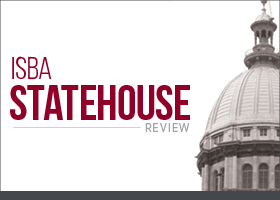ISBA Statehouse Review for February 5, 2019
 ISBA Director of Legislative Affairs Jim Covington reviews legislation in Springfield of interest to ISBA members. This week he covers perjury, interest on child support, the Disposition of Remains Act, the Condominium Property Act, foreclosure in cities of more than two million residents, post-judgment changes,and the Open Meetings Act.
ISBA Director of Legislative Affairs Jim Covington reviews legislation in Springfield of interest to ISBA members. This week he covers perjury, interest on child support, the Disposition of Remains Act, the Condominium Property Act, foreclosure in cities of more than two million residents, post-judgment changes,and the Open Meetings Act.
Perjury. House Bill 914 (Bennett, R-Pontiac) extends the statute of limitations for perjury to seven years. Current law is three years. House Bill 914 was assigned to House Criminal Law Committee.
Interest on child support. House Bill 929 (Parkhurst, R-Kankakee) to provide that the interest on child-support judgments must be calculated by applying one-twelfth of 5 percent (rather than one-twelfth of 9 percent) to the unpaid child support balance as of the end of each calendar month. Provides that every calendar year, beginning in 2021, the Department of Healthcare and Family Services is to determine the percentage of simple interest that accrues on unpaid child-support obligations. House Bill 929 has been assigned to House Judiciary Committee.
The Disposition of Remains Act. House Bill 1455 (Bourne, R-Litchfield) requires that any dispute concerning the right to control the disposition of a decedent's remains be resolved by a court within 30 days of the dispute being filed with the court. House Bill 1455 has been assigned to House Rules Committee.
Condominium Property Act. Senate Bill 220 (Murphy, D-Des Plaines) must first provide the unit owner a minimum of 20 days' written notice and an opportunity to be heard before the board may levy a fine. It also requires that the written notice must be made in compliance with the Act. These requirements apply only to the ability to levy fines, and Senate Bill 220 does not limit or restrict the ability of the board to pursue or enforce the rights of the association. Prohibits the association from reporting adverse information to a credit reporting agency or initiating collection proceedings against a unit owner for unpaid fines unless the board of managers has first complied with the notice and hearing requirements. Senate Bill 220 has been referred to the Committee on Assignments before being sent to a substantive Senate committee.
Foreclosure in cities of more than two million residents. Senate Bill 169 (Mulroe, D-Chicago) amends the Code of Civil Procedure to provide that the failure to send a copy of the notice of foreclosure to the alderman or to file an affidavit as required results in a fine of $500 payable to the ward in which the property is located. Under current law, it results in the dismissal without prejudice of the complaint or counterclaim on a motion of a party or the court. Senate Bill 169 has been referred to the Committee on Assignments before being assigned to a substantive committee.
Post-judgment changes. Senate Bill 181 (Mulroe, D-Chicago) makes the following changes to post-judgment proceedings. (1) Provides that a judgment creditor is entitled to prosecute citations to discover assets (instead of supplementary proceedings) for the purposes of examining the judgment debtor or any other person to discover assets or income of the debtor not exempt from the enforcement of the judgment, a deduction order or garnishment, and of compelling the application of non-exempt assets or income discovered toward the payment of the amount due under the judgment. (2) Deletes language providing that it is not a prerequisite to the commencement of a supplementary proceeding that a certified copy of the judgment has been returned wholly or partly unsatisfied. (3) Provides that summons shall be returnable not less than 21 nor more than 40 days (rather than 30 days) after the date of issuance. (4) Provides that summons shall be served with one copy (rather than four copies) of the interrogatories and that a summons shall be served in the same manner as provided by the Illinois Supreme Court Rule for additional relief upon a party in default. It has been referred to the Committee on Assignments to be referred to a substantive committee.
Open Meetings Act. Senate Bill 196 (Bush, D-Grayslake) expands the exceptions for which a public body may hold a closed meeting. Under current law, a public body may do so to consider a specific employee or legal counsel concerning the specific employee’s appointment, employment, compensation, discipline, performance, or dismissal. This includes hearing testimony on a complaint lodged against an employee. Senate Bill 196 expands this to include specific independent contractors or specific volunteers or complaints against independent contractors or volunteers. Senate Bill 196 has been referred to the Committee on Assignments to be referred to a substantive committee.

